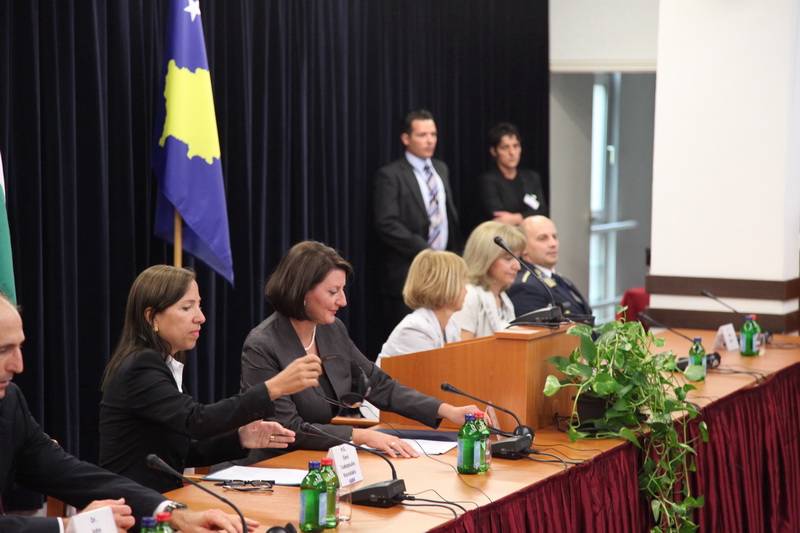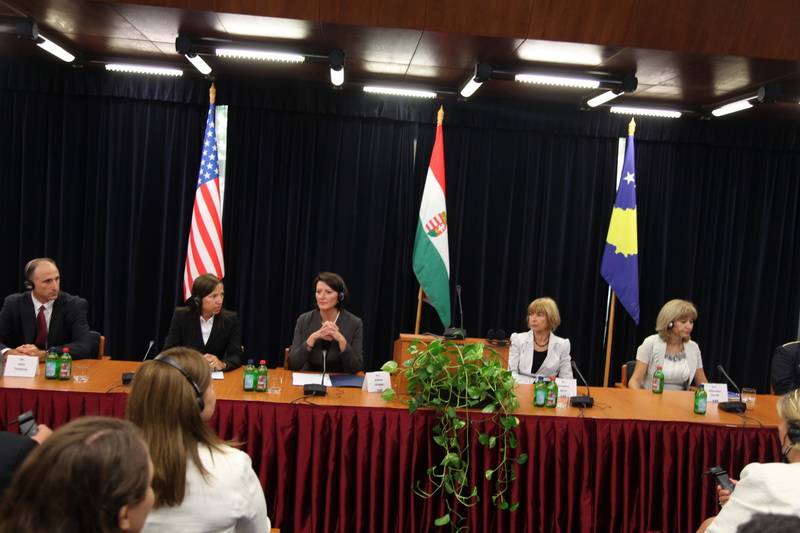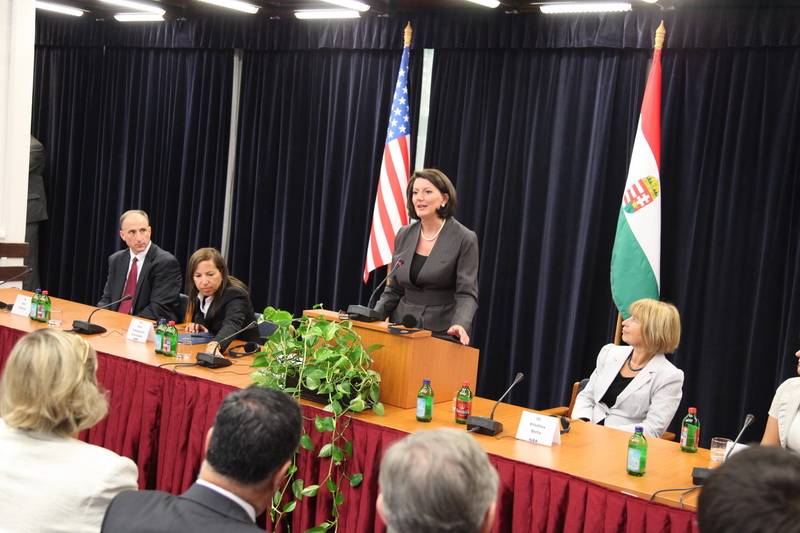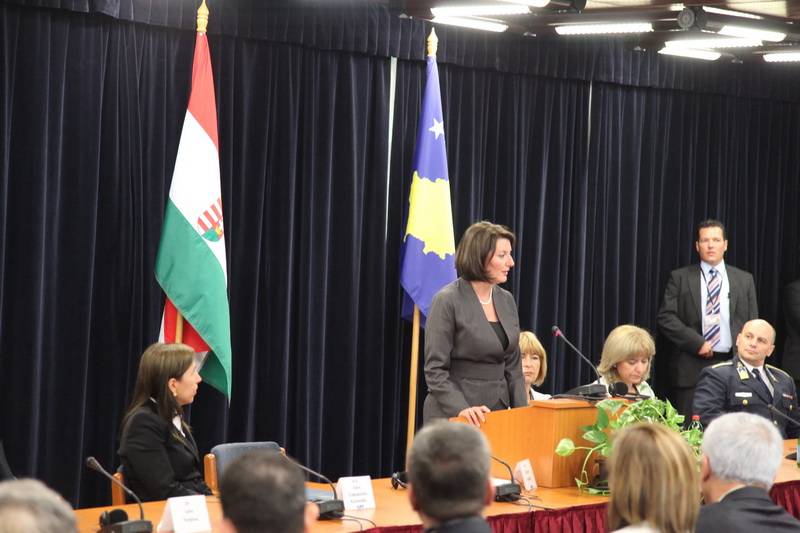We are all committed to create a more just, peaceful and stable world and we are united in encouraging a joint response in enhancing security and protecting liberties.
Dear Mr. Pertinas, Mr. Stocking and Ms. Gosi,
Members of the International Law Enforcement Academy,
Ladies and Gentlemen:
We are all committed to create a more just, peaceful and stable world and we are united in encouraging a joint response in enhancing security and protecting liberties.
As Aristotle noted about two thousand years ago, “the only stable state is the one in which all men are equal before the law.”
In order to jointly confront the ills of today that we all face, and protect the hard-won rights of our citizens to live and work peacefully, we need to uphold this principle, put the emphasis on cooperation, pledge to undertake joint action, invest in preventive measures and renew our commitment to exchange accurate and swift information with each other.
We need to strengthen our platform of collaboration, build a system of education and prevention that will create unfavorable circumstances for criminals and networks that want to use people, countries and transnational routes to spread and expand their crimes.
We need to find all mechanism possible to prevent our societies from becoming complicit with the criminal networks and the values of our societies eroded by organized crime.
Thus, as societies and leaders we need to be ahead, more committed and motivated than these criminal networks at all times.
There are challenges we share and transnational threats we face – from terrorism and organized crime, narcotics smuggling and human trafficking, to cyber space – that we need to fight together.
We cannot be successful in this fight against these threats if we think of crime and criminal networks in isolation.
Organized crime is not a Kosovo-specific problem. It is a transnational phenomenon that operates through fluid networks.
As some of you may know, societies in transition are a haven for organized crime groups. This is the case for several reasons. For one, these are countries that emerge from a dictatorship, an iron grip if you wish, and experience an institutional breakdown.
These societies are not democratic; they suppress human rights and the freedom of speech. In such an environment, there is an obvious lack of alternative institutions, like political parties, to offer a form of societal organization. What follows is anarchy.
In this situation of insecurity, space is created for criminal groups that benefit from lawlessness, which organize swiftly and take advantage of the power vacuum. They expand their network of contraband and theft, eliminate or blackmail their opponents, destroy business by racketeering and create ties that impact the political configuration of the future.
Depending on the geographical position from where these criminal groups are created, they adjust and expand their activities to suit their long-term interests and to position themselves to benefit from the political cover and impunity by installing their candidates in power and establishing an informal pact.
In the former Socialist countries, these criminal structures that enjoy full power in the transitional period and create pre-state institution, usually consist of former state security agencies. They use their experience and their former expertise by using the files and information about third parties to blackmail their opponents into submission.
By possessing knowledge about the resources of the country, including those that were hidden from the public during the dictatorship, and using the ties across borders with other agencies, these leaders of criminal networks use the process of privatization of public property to accumulate wealth and to dictate the market.
Additionally, transitional countries see a lot of money laundering that is usually done by family clans and familial ties, or business links with the outside world by using international banks.
Inside the countries, these structures impact the political environment by supporting financially and providing protection for certain political leaders and structures. Their goal is to help politicians win the votes and then exert influence over them for favorable deals in the privatization process and tenders, like road reconstruction and banking licenses.
Under the seal of democratic pluralism, these semi-formal groups control most avenues of life. They seek to take hold of the media to impact the public opinion, install their loyalist to high ranking positions in the institutions, open private universities to create the next generations of devotees.
The period of transition in these countries is not much different from dictatorship, but coated with democratic cover. The immediate consequences for the society at large are its stratification into rich and poor, at the expense of the intellectual middle class and the small business owners.
In these countries, the level of development drops, while the consumerism grows. The capacity of law enforcement agencies increases. The investments from state budget increase in construction of expensive infrastructure, through projects that are awarded to those with links to people in power. In these countries, monopolies are created, which split the society in terms of regions and certain political structure. Oppression of the political and economic opponents is the consequence of this development.
The ties are then developed with foreign investors who are favored in the allocation of tenders, and take the money awarded out of the country.
These are some of the characteristics of former socialist countries in transition. You probably have seen some of these episodes played out in your countries. The capital that once was a public or state-owned treasure is now accumulated in the hands of a few.
The situation is starker in the countries that have gone through wars because in these places the structures that emerge in post-conflict are a mixture of paramilitaries, militaries and police who then reintegrate in the civil life but maintain the previous structure.
These structures use the authority and the fame they gain during the war period to capture important positions in the institutions. We have seen a similar example of this in Serbia, when a network of paramilitaries, members of special units and figures in the organized crime assassinated the country’s first democratic Prime Minister. The fury of these organizations is such that they will not stop at anything when their position of power and influence is at risk.
The society and the state institutions should be equipped with laws and rule of law in confronting these ills. This is the only weapon available that people have to ensure that the values and a sense of normalcy are restored. It is the only way to maintain a sense of dignity and freedom.
Therefore, a lot has to be invested in adopting legislation that is watertight and law enforcement institutions that are willing to take a stand against organized crime. The other fundamental rule is to properly separate the power of the legislative, the executive and judiciary as well as to make it clear that there are no red lines and that no one is above the law.
They are the preconditions not only to properly fight organized crime, but also to organize the society.
On top of that, it is of utmost importance to build three key pillars: the police, the prosecution and the courts, which are to be filled by people who are committed, honest and dignified, paid well and protected by law.
Most of the countries in transition, my country included, should pay attention to the implementation of the rule of law as much as they pay to the process of reconstruction and economic issues. This holds true especially for the area of development, where foreign investment is required to jumpstart the economy, but which will not be attracted if there is no rule of law and protection of the investment.
Another important step is the adoption of specific laws on prevention and fight of organized crime, including the law on the confiscation of assets. This law is one way to defeat organized crime by attacking its fruits, which will help restore the trust of the citizens in their institutions. The other measure is the protection of witnesses, which offers safeguards to whistleblowers and their families.
From the perspective of politics, which respects the separation of power and implements the code of laws, the key principle should be free and fair elections. Only those political candidates who have the support and the vote of the majority of the people will be in a position and have the courage to establish the rule of law and introduce a policy of zero-tolerance for organized crime. The electoral system and parliamentary oversight ensure that the politicians’ goals be quantified and that they are held accountable by the voters for their actions. International election monitors and international incentive are a crucial factor in offering guarantees for free and fair elections with few irregularities.
Honored Ladies and Gentlemen,
The criminal networks that are our targets are not constrained by sovereignty; they are connected by interest and do not recognize borders. They even overlook ethnic differences. In fact, in this context, political enemies are partners in crime.
In the region, we find Kosovar Albanians and Serbs participating in the same criminal enterprise like in the case of their cooperation in smuggling people illegally to Western Europe.
I probably do not need to remind you that our two countries were linked by a tragic event two years ago, when a boat carrying numerous unfortunate people, who tried to reach Western Europe countries, capsized in the icy waters of Tisza. Fifteen Kosovo citizens, among them children, drowned that night in the river.
But in line with what you advocate here in ILEA, in the midst of this tragedy, law enforcement officials and judiciaries in the region emerged determined to cooperate to prevent activities of these criminal networks from exploiting our legal and political loopholes. They began a major and complex investigation that involved multiple countries and jurisdictions to secure a conviction for this joint criminal enterprise.
The region drew two important lessons from this tragic case: Organized crime is a transnational phenomenon and we need a concerted transnational response to fight it.
No country alone can fight organized crime.
That is why, at this juncture, to be more efficient in fighting organized crime and other transnational threats, Kosovo as a state needs to be included in multilateral regimes and international member organizations that focus on fighting these threats.
So far, due to the political blockades imposed by Serbia in regional organizations where consensus is needed for membership, Kosovo has been cut off of these important relationships. This has left my country in a position where responsibility to fight organized crime is demanded yet no access to information and joint action is granted.
Kosovo’s institutions have nevertheless forged important relationships with individual countries in the region and across the world, which recognized Kosovo as a state, to respond to the challenge that transnational crime imposes. We have proved to be a reliable partner in every single way.
In many cases, this cooperation has resulted in speeding up the exchange of information, assistance in surveillance and in prevention or successful investigation of organized crime that at times led into the full destruction of these criminal networks.
After the war, Kosovo has welcomed different international civilian, military and rule of law missions. They were successful in state-building, by helping Kosovo create its own capacity through democratic process, but also in founding the security mechanism.
Kosovo police is a good example of this joint effort. Its members are well educated and well trained through the best practices of the United States and European Union. Another successful story is the Kosovo Security Force, a civil emergency organization that may be the nucleus of Kosovo’s future army, trained by the best NATO programs.
These institutions and the international assistance have ensured Kosovo would not be a source and an exporter of organized crime. Because of its geographical position, which sits in the path between the East and the West, Kosovo has been identified as a transit route of several types of crime that confront us today: human trafficking, narcotics trade, contraband of weapons and goods. Similarly, other countries in the region are more or less in the same position.
The rule of law is at the center of our efforts to establish a stable state and to contribute to the stability and the security of the region.
The prosperity and our strategic goals of joining the European Union and NATO all hinge on the successful establishment of the rule of law.
As the US President Dwight Eisenhower once said, “the world no longer has a choice between force and law; if civilization is to survive, it must choose the rule of law.”
Kosovo has chosen the rule of law.
Thank you!
This post is also available in: SQ




